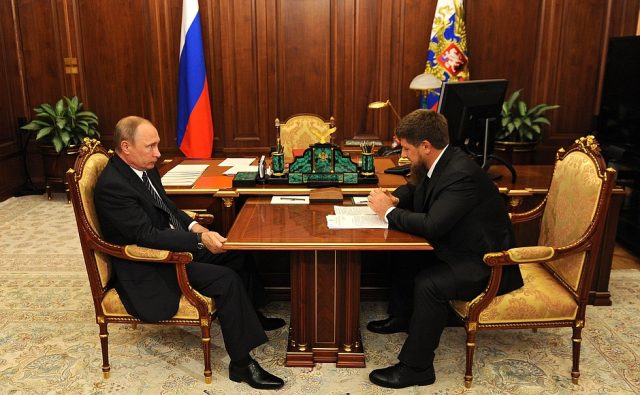
Amidst His Conflict With Russian Security Services, Kadyrov Seeks Putin’s Support
Publication: Eurasia Daily Monitor Volume: 13 Issue: 142
By:

On August 25, the president of the Russian Federation, Vladimir Putin, held an unusually late, evening meeting with the governor of Chechnya, Ramzan Kadyrov. The portion of their discussion published on the Kremlin’s official website gave no apparent indication as why this meeting needed to be held with such urgency. According to the official transcript, the conversation consisted primarily of Kadyrov reporting to his superior on the Chechen government’s economic achievements. Toward the end of their meeting, Putin unexpectedly promised to visit Chechnya to inspect the republican governor’s accomplishments (Kremlin.ru, August 26).
In reality, the reason behind Kadyrov’s oddly scheduled meeting with Putin can be traced back to an incident from a week earlier; and the sense of urgency with which their tête-à-tête was held indicates that Chechnya’s governor clearly needed the Russian president’s reassurances. On August 17, authorities in Moscow arrested five individuals: officers of the Chechen “Sever” battalion Said Akhmaev and Lechi Bolatbaev, Ingushetian brothers Movladi and Akhmed Bulguchev, as well as businessman Yevgeny Katkov. Investigators accused the men of attempting to extort the equivalent of $1.5 million from a local business owner. Bolatbaev is reportedly “the closest person to Adam Delimkhanov in Moscow.” Delimkhanov, in turn, is a Russian State Duma deputy, as well as Ramzan Kadyrov’s cousin and one of his closest associates (Kavkazsky Uzel, August 25). The arrest of the five individuals with close links to Delimkhanov, therefore, directly affected Kadyrov. Hence, it is highly likely that Chechnya’s governor tried to shield himself and his men from the attack by Russian authorities. A meeting with President Putin normally signals to Russian government agencies that the person is still favored by the Russian leader and is “untouchable.”
Sources in the Russian security services told the Rosbalt news agency that the arrest of Delimkhanov’s associates was a “demonstrative” (pokazatelnaya) action. According to the sources, two Russian businessmen, Konstantin Zhukov and Yevgeny Katkov had a financial dispute, and the latter asked his relatives for help. One of the relatives turned out to be the wife of a man in Adam Delimkhanov’s entourage. Thus, Said Akhmaev and Lechi Bolatbaev soon became involved in the Zhukov-Katkov quarrel. Indeed, both men often accompanied Delimkhanov in Moscow and were part of the Chechen official’s so-called “headquarters” at the President Hotel, in the Russian capital. As the aforementioned business dispute worsened, Konstantin Zhukov was taken to the President Hotel and threatened with a criminal prosecution and “extradition” to Chechnya. But according to Rosbalt’s sources, Zhukov then complained to his friends in the government, and “the Russian authorities at the highest level” decided to act (Rosbalt, August 24).
Chechen officials in Moscow have engaged in numerous similar incidents in the past, so it is unclear why the authorities cracked down in this particular case, the news agency’s sources noted. One explanation is that the Russian officials justified it to themselves that the attack was directed at people close to Delimkhanov but not to Kadyrov. The Chechen governor, unlike his Duma member cousin, is apparently considered immune to their attacks. Delimkhanov apparently left Moscow hours before the arrest of his close associates “to attend a government meeting” (Rosbalt, August 24); so he may still be inaccessible to the Russian security services.
The circumstances surrounding the August 17 arrest of the alleged racketeers in Moscow point to the possibility that the Russian security services have continued their concerted effort to limit the influence of the Chechen governor outside the republic. Although Putin’s own position on this case remains unclear, it is unlikely that he is unaware of the campaign and does not at least partially support it.
Some analysts have long noted that relations between Kadyrov and the Russian security services—particularly the powerful Federal Security Service (FSB)—have been quite rocky. The security services reportedly resent the power Kadyrov received directly from Putin, which allows him to control Chechnya and even carry out operations outside the republic—something no other Russian governor has the ability to attempt. The conflict especially intensified after the brazen assassination of the prominent Russian opposition figure Boris Nemtsov in central Moscow, in February 2015. Russian security services quickly apprehended several individuals with ties to the Chechen government. Since then, the security services have tried to pursue the investigation but never fully completed it, apparently due to internal political battles. The attack on Delimkhanov, therefore, is seen by some as a roundabout assault on Kadyrov by the Russian security services. Even though Kadyrov himself still appears off limits, his closest associates, such as Adam Delimkhanov, are apparently starting to feel the heat generated by the resentment among various Russian officials (Rusmonitor.com, August 27).
Meanwhile, Ramzan Kadyrov is gearing up for Chechen governor elections, which will take place on September 18. Assuming he wins, Kadyrov will be the only elected republican governor in the North Caucasus. All of the region’s other republics have governors appointed by Vladimir Putin. Elections will further strengthen Kadyrov’s position not only Chechnya but also in neighboring territories. Thus, his enemies in Moscow are reportedly trying to undermine the ruler of Chechnya prior to the polls (Rusmonitor.com, August 27). Even though Putin is publicly showing his support for Kadyrov, it appears that he implicitly supports the Russian security services’ pressure on the Chechen governor’s entourage. The goal seems to be to strip Kadyrov of his support base and downgrade him to more of an average governor of a Russian region—one who is fully dependent on Moscow and entirely replaceable by the Kremlin at any time.




